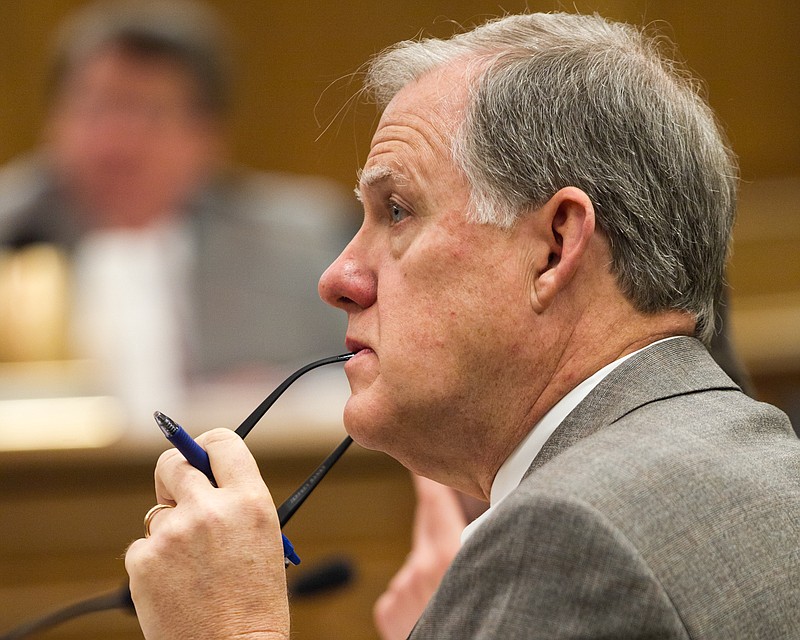NASHVILLE - Tennessee Revenue Commissioner Richard Roberts says he hopes to address some of small businesses' concerns with his department's proposed rule that would require out-of-state internet and other retailers to collect sales taxes on items sold to Tennesseans.
The proposal, one of a dozen or so efforts by states to force the U.S. Supreme Court or Congress to deal with the online sales tax issue nationally, was the subject of a Revenue Department hearing earlier this week.
Jim Brown, Tennessee's state director for the National Federation of Independent Business, raised concerns at the hearing about a specific provision's impact on small companies.
The proposed rule sets a $500,000 annual sales threshold for out-of-state companies that have no physical presence in Tennessee before they are required to begin collecting state and local sales taxes that can reach as high as 9.75 percent.
Businesses with a physical in-state presence are already required by law to collect and send to governments the state's 7 percent sales tax as well as city and county local option taxes of up to 2.75 percent. But a 24-year-old U.S. Supreme Court decision prevents states from taxing "remote sellers" with no physical presence or, in legal jargon, "nexus" in a state.
Brown fretted small to mid-size out-of-state vendors might unexpectedly hit the $500,000 threshold by year's end and get caught in a jam.
While many larger dealers will begin collecting and remitting any sales and use tax due from the start, smaller businesses will likely "wait to see if they approach or trigger the threshold," Brown said.
"The department has stated dealers who reach the threshold would be responsible for collecting and remitting the tax for all transactions that occurred before reaching the threshold, and be responsible for remitting any uncollected retroactive tax due," Brown said. "Both are problematic."
He called it a "significant burden" that could have a "chilling effect" because those businesses would be "required to go back and communicate with potentially hundreds of customers that tax is owed on a prior transaction. Many customers will resist since the transaction has long been completed."
Brown suggested the department instead implement the proposed threshold, if adopted as expected, on a prospective basis. He said the state should base the requirement either on a business's previous year's sales or an average of the previous two to three years' worth of sales.
If a business's previous average exceeded the $500,000 threshold, only then would they be required to collect Tennessee's 7 percent state sales tax and local government sales taxes of up to 2.75 percent.
Revenue Commissioner Roberts said in a later interview that he had spoken with Brown and state-based tax practitioners "and agreed we needed to put a little bit more meat on those bones."
Assistant Commissioner Kristin Husat, the department's general counsel, said a major purpose of rule-making hearings is to examine potential problems.
A number of state-based internet sellers are objecting to Tennessee's proposed rule, saying they fear other states will retaliate with similar rules. But the Tennessee Retail Federation and many brick-and-mortar stores favor the rule.
They argue that because out-of-state vendors with no physical presence here don't have to collect sales taxes, their online, catalog and TV competitors enjoy a nearly 10 percent government-imposed price advantage.
Internet giant eBay and others object to Tennessee's proposed rule with some calling it unconstitutional, pointing to the Supreme Court's 1992 ruling in Quill v. North Dakota.
"There's nothing in the Constitution of the United States that says internet sellers can sell without tax," Roberts said.
Last year, Supreme Court Justice Anthony Kennedy, writing in a ruling involving legal jurisdiction of state sales-tax cases, openly invited states to challenge the high court's 1992 Quill ruling, which occurred before internet giants like eBay even existed.
"There is a powerful case to be made that a retailer doing extensive business within a state has a sufficiently 'substantial nexus' to justify imposing some minor tax-collection duty, even if that business is done through mail or the internet," Kennedy wrote.
Mail-order sales in 1982 were an estimated $180 billion, Kennedy noted. In 2008, Kennedy said e-commerce sales totaled $3.16 trillion.
"A case questionable even when decided, Quill now harms states to a degree greater than could have been anticipated earlier," Kennedy wrote, later adding, the "legal system should find an appropriate case for this court to re-examine" its past decisions.
That's prompted the current rush by various states like Tennessee, Alabama and South Dakota to pass laws or rules they know will be legally challenged and, in fact, already are. The strategy is to get the issue in one form or another before a Supreme Court they think is open to resolving an issue that Congress has refused to address.
"I've never seen the court come out so blatantly and say please bring us a case," said Husat, the Revenue Department's general counsel.
Tennessee estimates it is losing an estimated $350 million to $500 million a year because of sales by remote vendors.
Contact Andy Sher at asher@timesfreepress.com or 615-255-0550. Follow on twitter at AndySher1.
